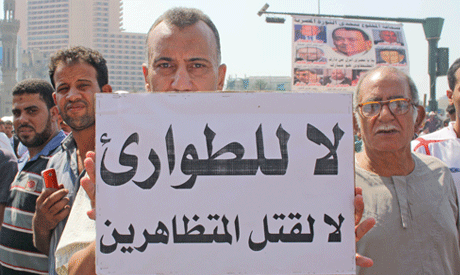
A man Carrying a banner which reads "no to emergency law" (Photo by Mai Shaheen)
Activists have called for a march to take place Monday afternoon against the renewal of long fought against emergency law. The call came in response to statements made by the Supreme Council of the Armed Forces (SCAF) that it will be applying the law more efficiently and would be widening its scope to fight thuggery.
In a statement released by 15 movements, parties and coalitions, emergency law was described as another attack on freedoms, the national movement and the revolution’s goals. The statement called on all Egyptians to join the march planned to begin in Tahrir Square and head to the Cabinet's offices.
A demonstration had been previously planned Friday to protest emergency law. However, the Friday call was neither adopted by most movements nor widely attended. Some have expressed concern over the low turnout. Lawyer Montaser El-Zayat says he was shocked and worried to find so few people out on Friday, adding that an end to emergency law has been one of the revolution’s most urgent demands. On the other hand, many believed that the reason Friday was not a success is that most movements did not have time to plan for it. For example, the 6 April Movement had released a statement prior to Friday saying it would not be officially participating but welcomed individual participation.
On the other hand, the No to Military Trials Friday proved successful, being the first time Tahrir was fully reoccupied since the military forcefully dispersed a sit-in on the first day of Ramadan. Its success might be an indicator that the Monday march will also be a success since it was called for by the same movements. Moreover, activists have often compared the military trial of civilians to emergency law, arguing that they are used for similar purposes, ultimately to restrain freedoms of expression and political action despite government and military council claims that they are used to confront widely spreading crime and thuggery.
According to Amnesty International, those arrested under emergency law are tried before special courts known as Emergency Supreme State Security Courts, which, like military courts, violate the right to a fair trial and deny defendants the right to appeal.
Some argue that the only reason the law is being renewed now is the new wave of strikes hitting Egypt and the reemergence of demonstrations on 9 September, when hundreds of thousands re-took Tahrir Square. Lawyer Haitham Mohamadein, member of the Workers Party, says “the renewal of the emergency law is just another method of terrorising the rising movement. Proof of that is that it was only applied after the success of 9 September. It is not true that emergency law is set to replace the military trial of civilians, because all those arrested on 9 September were still transferred to the military prosecution."
He adds: “the emergency law is just another law to add to the other set of laws meant to scare people, for example the law criminalising strikes."
The law criminalising strikes is also on activists’ blacklist of laws targeting freedom of expression and political action in addition to military trials and emergency law. The Monday march is planned to protest all three.
Emergency law in particular has a long history and has been under attack by rights activists for years before the revolution. Under the Mubarak regime, emergency law was widely used to suppress dissent since it gave security forces unrestrained powers of search, arrest and detention. One of the main demands of the revolution was to end the state of emergency which allowed exceptional police powers.
However, although the law was amended under the Mubarak regime in 2010 to be limited to terrorism and drug crime, the currently ruling SCAF, which took over after the ouster of Mubarak, has reverted the law to its original scope. Currently the law again includes disturbing traffic, blocking roads, broadcasting rumours and assaulting freedom to work as offences.
The 6 April Movement launched a campaign explaining what the implications of the renewal of emergency law would be on people's lives. The flyer distributed read: “Emergency law means you get sentenced up to 15 years if you are standing together with your friends in the street, the police comes in and searches your home without permission while you are having dinner with your wife, and every sentence you tell your friends over the phone is recorded because the phones are tapped.”
Although 6 April is not participating in the demonstration, it is campaigning against emergency law in Egypt’s different governorates. Mohamed Adel, the movement’s official spokesperson, said “we are working in the streets to explain to people the problem with emergency law. The only reason we are not participating is that we rather not limit ourselves to Tahrir Square."
Groups calling for the demonstration include the Revolutionary Youth Coalition, the People’s Alliance Party, the Campaign in Support of ElBaradei, the Justice and Freedom Youth, the Democratic Workers Party, the Social Democratic Party, the Democratic Front Party, the 6 April Democratic Front, El-Lotus Movement, the Free Egyptian Movement, the National Front for Justice and Democracy, the Popular Committees for the Defense of the Revolution, the Egyptian Current Party, the Awareness Party, the Socialist Renewal Current, the Center for Socialist Studies and the No to Military Trials Campaign.
Short link: